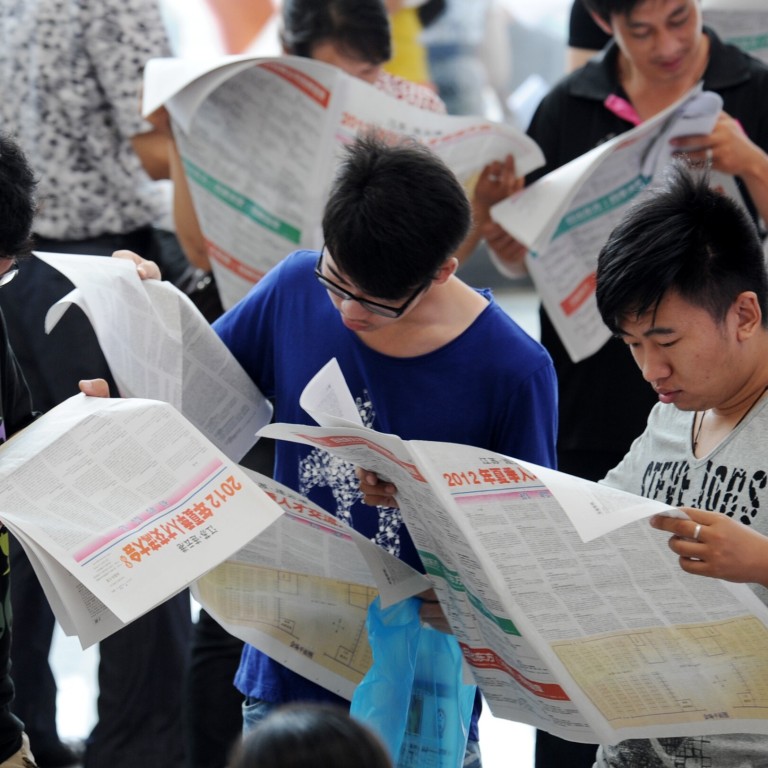
Is this China’s ‘Great Resignation’? Freelancers find both hope and uncertainty in bid to escape 9-to-5 grind
- Intense pressure, long working hours and relatively low wages have convinced millions to embrace ‘flexible employment’ and freelancing, often in a gap between full-time work
- Income is important, but Gen Z and younger millennials say their ideal jobs offer freedom while allowing them to pursue their passions
With China’s working environment becoming increasingly stressful and competitive, Zheng Lizhu’s career ambitions as a designer shifted dramatically earlier this year.
“The competition and anxiety in the design industry made my toes curl,” Zheng said. “I worked like a machine every day. By the time I got home I’d already be exhausted, and my mind would be blank, with no time or energy to think or reflect on myself.”
Devoting her whole life to the company wasn’t a fair trade-off, the 30-year-old said, noting that she was regularly required to work overtime and had to be on standby 24/7. The toll eventually drove her to resign from her job and explore new options as a freelancer.
“Now, as a freelance designer, I have control over my time and the way I work,” Zheng said.
Hers is a situation that is becoming increasingly commonplace in China, as a portion of the crestfallen and discouraged workforce – including fresh university graduates – attempt to wrest back control of their time and freedom without completely retreating from society.

This sort of employment shift has gained traction at a time when the United States is coping with what some have dubbed the “Great Resignation”, with record numbers of people quitting their jobs as the pandemic wanes. The US Bureau of Labour Statistics said 4.3 million workers quit in August, at a rate of 2.9 per cent – the highest ever recorded by the bureau.
Indeed, workforces around the world are taking new shapes and forms in a post-pandemic climate, and that includes China’s. Its shift, however, may run a bit deeper. It comes as the term “involution” has gained popularity in China over the last couple of years. This refers to how some people have responded to what they deem to be increasingly unreasonable working conditions that have arisen as the number of available workers swells while resources and quality jobs remain limited, resulting in longer hours and less pay.
Chen Long, a postdoc fellow in sociology at Peking University, laid bare the problem with involution during a panel discussion earlier this summer. The term was originally used to explain a process in which additional input does not produce more output.
In the face of intense involution, he said, many Chinese people are refusing to be exploited as cogs in the machines of big companies such as those in the technology sector. Some go as far as to “lay flat” – a popular yet controversial phenomenon where people opt out of the competition and consumerism for a lifestyle of low desire and low consumption.
The problem has become so serious that it’s being addressed at the highest levels of government.
It is necessary to … avoid ‘involution’ and ‘lying flat’
On Friday, the Communist Party’s flagship journal on political theory, Qiushi, published a speech by President Xi Jinping, saying: “It is necessary to prevent the stagnation of the social class, unblock the channels for upward social mobility, create opportunities for more people to become rich, and form an environment for improvement in which everyone participates, and avoid ‘involution’ and ‘lying flat’.”
Chen posited that, when some people find that they cannot improve their environment, they become inclined to quit the rat race.
But rather than going to that extreme by throwing in the towel, Zheng and others see freelancing as an alternative path in their pursuit of success and passion for what they do, with an eye on preserving a work-life balance without resigning from competition entirely.
“Stress exists regardless of whether you have a job or freelance,” Zheng pointed out. “But now I am free, fulfilled and challenged – it’s actually beneficial to my growth as a freelance designer.”
With a stronger sense of autonomy, China’s Gen Z appears to have taken a page out of the millennial playbook. They, too, are interested more in trying new things and seeking more fulfilling jobs – often with more flexible work arrangements – rather than staying in conventional full-time roles.
Compared with the generations of their parents and grandparents, who longed for job security with a steady income and benefits – known as an “iron rice bowl” – the new generation has accepted that they don’t need formal employment or a regular profession to make a living.
“I didn’t start freelancing for more money,” said Frentee Ji, a freelance journalist. “I started it for more discretionary time and for work I can choose. But when you don’t have a stable income for a period of time, you can get anxious.”
Ji was tired of the monotony of the 9-to-5 grind and quit her job as a multimedia producer in 2019.
Aside from income, Chinese people under 30 years old say their ideal jobs give them freedom while allowing them to pursue their passion, according to a 2020 report by Zhaopin, a Chinese online recruitment services provider.
In the same report, “independent store owner” and “freelance photographer” were at the top two of the most wanted careers for young Chinese people, indicating a preference for being self-employed while maintaining flexible schedules.
From regular workers who crave a more balanced lifestyle, to delivery drivers who work night and day to bring in extra cash, Chinese people are increasingly joining the freelance workforce and shaking up the job market.
In the past, freelancers were mostly concentrated in professions that require expertise, such as writing, photography, art and accounting. But the rapidly developing digital landscape in China has generated a spate of new occupations in recent years, including live-streamers and delivery drivers.
Much has changed in just a few years. Back in 2016, a LinkedIn report said there were about 30 million freelancers in China. This year, government figures indicate that nearly a quarter of China’s workforce – more than 200 million workers – have flexible employment, which is an umbrella term that covers freelancers and other part-time or non-salaried positions.
China’s US$6 trillion digital economy, which pervades basically every industry, also provides platforms for entrepreneurship and self-starters who are opting for neither involution nor laying flat.
The development of the internet and the digitalisation of the economy boosted the explosion of new alternative jobs, some of which have flourished during the coronavirus pandemic.
In February 2020, soon after the first coronavirus lockdowns were imposed in China, the nation’s job market shrank by about 30 per cent, but demand for live-streamers actually grew by 132.55 per cent, according to a Zhaopin report.
The digital sharing economy has transformed the old employer-employee contract and has established a three-party relationship that involves platforms, service providers and consumers, according to Wang Yixin, executive director of public relations at Zhaopin.
“A kind of service that used to be operated and provided by a single company is now found on various platforms, and the individuals no longer need to be tied down to one company to earn income,” Wang said. “Rather, they can profit more flexibly through each platform.”
Companies are also increasingly accepting of flexible workers. More than 55 per cent of Chinese companies hired freelancers in 2020, according to a report published earlier this year by Renmin University of China.
“For companies, this is a way to lower costs,” Wang said. “In busy seasons, companies can bring in workers quickly and conveniently, and then these flexible workers can move to other industries. This is a win-win for both companies and workers.”
As flexible employment is now a powerful component in the nation’s economic engine, the central government has taken steps to protect the rights of flexible workers and ensure they receive proper welfare such as pensions, health insurance and workers’ compensation.
Of course, there are also drawbacks to freelancing that make many people reluctant to embrace it. These workers may find themselves struggling with an unstable income, and the stress that comes with it. Experts say there can also be a sense of isolation and loneliness that results from working independently, as many people experienced to a lesser degree during work-from-home arrangements during the pandemic. Many full-time workers still had colleagues they communicated with, even if not face to face.
Because of these factors, freelancing is often considered when employees are in transition from one full-time job to another. Rather than quickly take another job they are not entirely happy with, they may opt to freelance for a few months or longer while they find the right fit.
Miranda Wang, who worked as a freelance videographer for 2.5 years before taking her current full-time job with a Shanghai-based media organisation, said her passion for making documentaries led her to try freelancing. But income uncertainties and other factors eventually brought her back into the full-time fold.
To switch careers in the past, workers would have a gap in between their jobs … But now, the gap can be filled with all kinds of freelancing
“Sometimes the clients would delay my payments for six, seven months,” she said. “My social insurance was also cut short while freelancing because I didn’t pay for it myself. I didn’t want it to affect my retirement pension, so I thought it would be easier if I just found an employer.
“Thirdly, my work cycle was so different from my boyfriend’s. I was either bored and idling around while he was out, or working on intense deadlines without any coworkers. Over time, it became bad for my mental health.”
And while many freelancers do not maintain that professional lifestyle for more than a few months or years, Wang pointed out the new job landscape also provides workers more options and diverse opportunities.
“To switch careers in the past, workers would have a gap in between their jobs, whether to learn new skills or to prepare and adjust themselves for a new industry,” she said. “But now, the gap can be filled with all kinds of freelancing. They can gain all sorts of experience by trying new work.
“Maybe they’ll go in a new direction if they find something interesting in the process; anything’s possible. It’s drastically changed from a time when people just did one thing at one place for life.”

